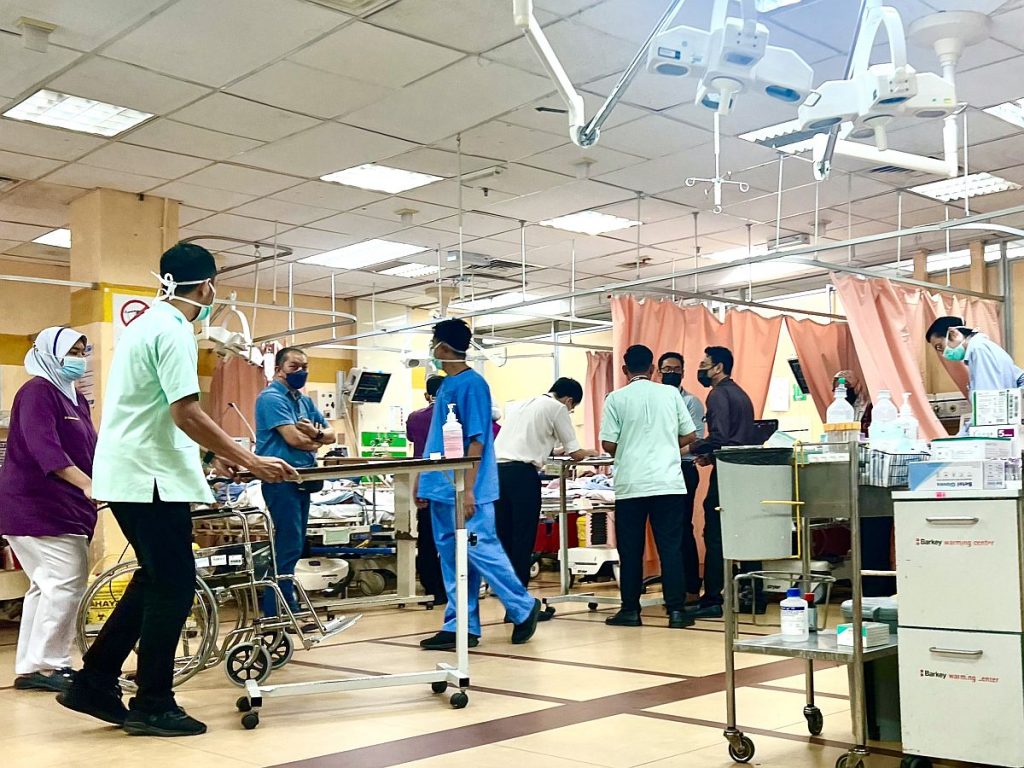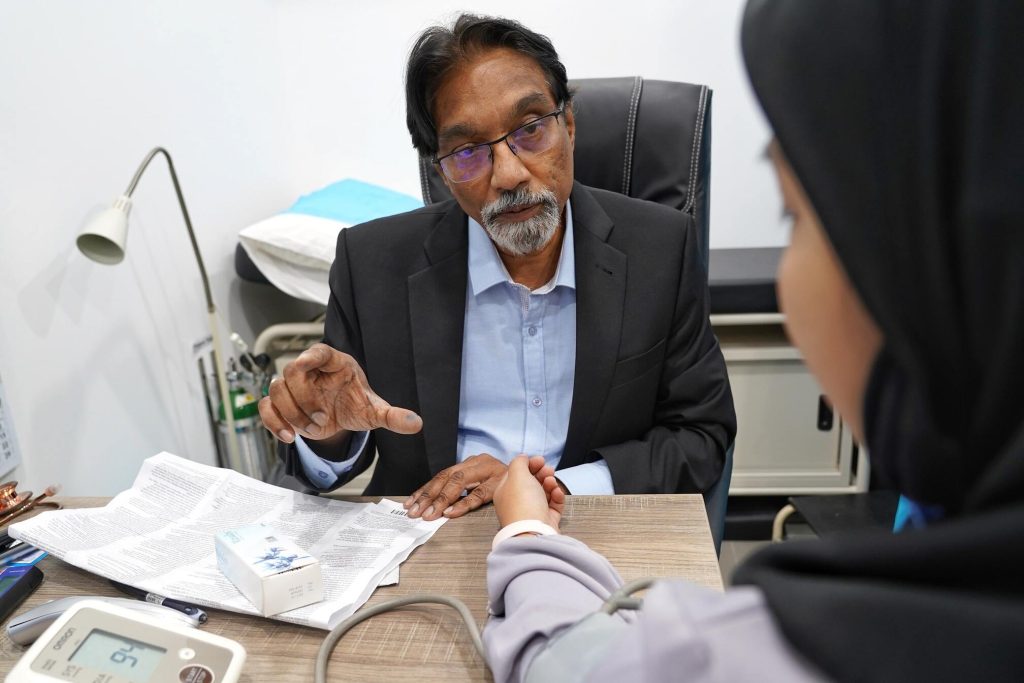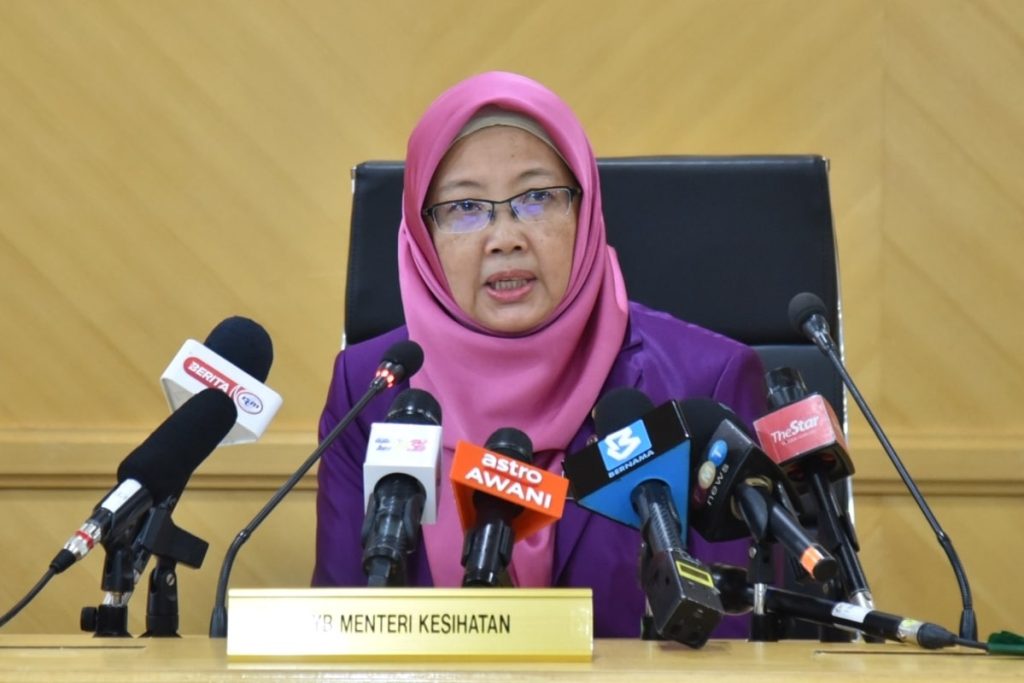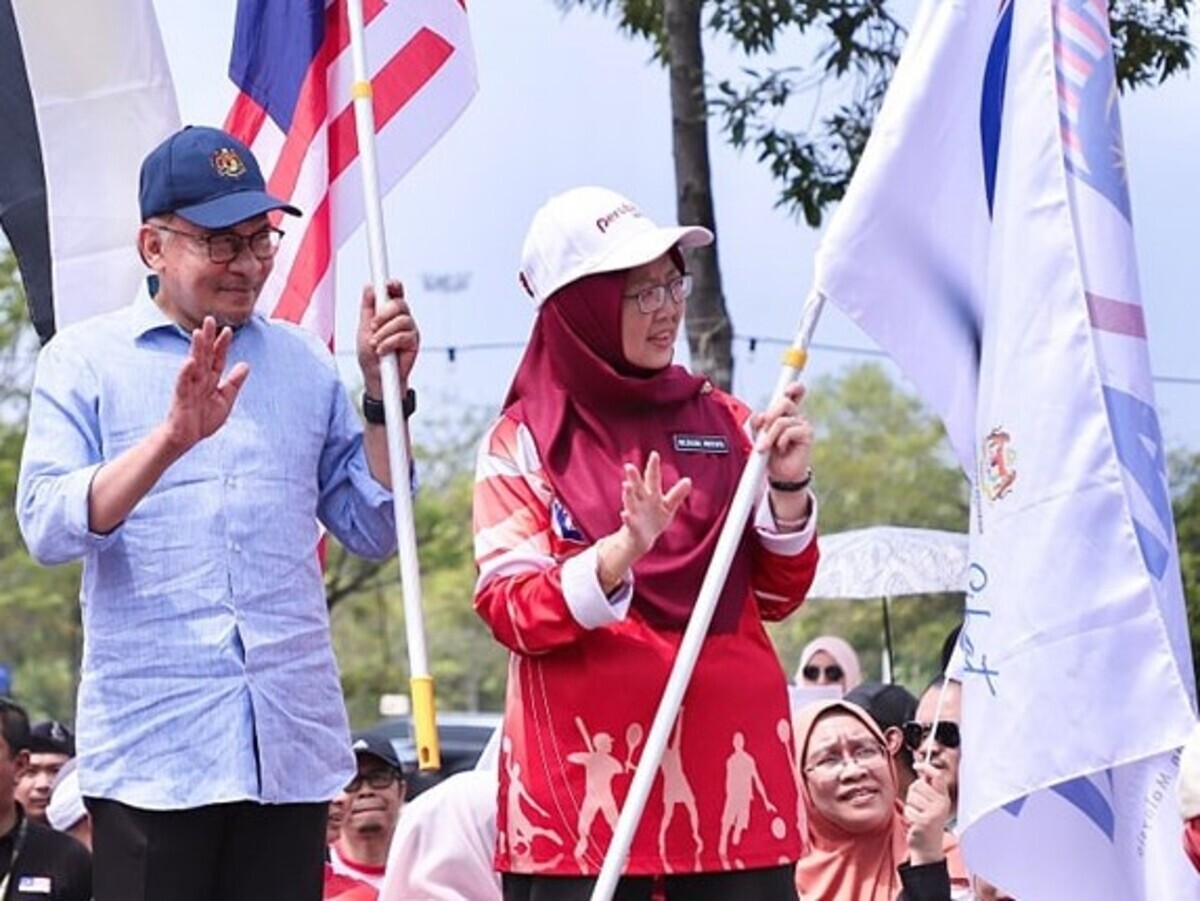KUALA LUMPUR, Dec 8 – Prime Minister Anwar Ibrahim’s administration came into power after the acute phase of the Covid-19 pandemic that wrecked the country’s health care system and left Malaysians much sicker after three years of delayed non-Covid care.
Yet, instead of taking chronic issues seriously – particularly the shortage of doctors, nurses, and other health care professionals who quit the public health service in droves last year – Anwar’s government appeared to treat health care manpower as a perennial problem from the 90s, as opposed to a dire exacerbation of a crisis triggered by staff burnout and heavier patient load from the pandemic.
Another low point in the past year was the government’s unprecedented move to create a regulatory gap in tobacco control by removing liquid nicotine from control under the Poisons Act 1952 for the purposes of taxing e-liquids with nicotine. This effectively legalised the sale of e-cigarettes and vapes with nicotine to minors below the age of 18 since April this year.
Dr Zaliha Mustafa – appointed health minister in Anwar’s Cabinet about a year ago on December 2, 2022 – is a first-term MP who never held public office prior to her appointment to oversee one of the largest organisations with a quarter of a million staff in the Ministry of Health (MOH).
Previously, CodeBlue did not rate the performance of the Perikatan Nasional (PN) and Ismail Sabri Yaakob’s administrations from 2020 to 2022 because CodeBlue was completely focused on the Covid-19 crisis, during which CodeBlue published countless critical on-the-ground reports and analyses of the government’s pandemic response.
This included an order, signed by Health Minister Dr Adham Baba, prohibiting travel beyond 10km from one’s residence during the Movement Control Order (MCO) in April 2020 that did not exempt travel for medical purposes. (After CodeBlue’s report, the MCO was loosened to permit patients to travel for treatment).
CodeBlue also broke the story on the scandal surrounding ownership of the MySejahtera app, and its data safety and privacy issues, during Health Minister Khairy Jamaluddin’s tenure in 2022.
CodeBlue’s review of the first year of the Anwar administration focuses on three key issues: tobacco control and public health, the health care workforce in the public sector, and overcrowded emergency departments.
Based on these three issues, CodeBlue’s report card gives the Anwar government Grade D for health.
Legalising Nicotine Vapes For Children

The exemption of liquid nicotine from the Poisons List last March 31 to enable taxation on e-liquids with nicotine – amid zero regulations on e-cigarettes – allowed tobacco companies like British American Tobacco (BAT) to enter its disposable vape product into the Malaysian market; opened up the floodgates for advertising, sponsorship and promotion of vapes; and legalised the sale of such nicotine products to minors aged below 18.
This is the biggest contributing factor to CodeBlue’s Grade D for the Madani government in health. Were it not for other mitigating health care projects, Anwar’s administration would have received Grade F for health over the delisting of liquid nicotine alone in CodeBlue’s report card.
Never before has a health minister been sued by anti-tobacco groups in Malaysia, a mark of ignominy for any government that is supposed to protect public health and citizens from Big Tobacco.
Tobacco control is a basic health issue that any health minister, especially an MD, should exercise extreme caution with, given its global and political ramifications.
The Anwar administration notched another black mark in history, with its health minister reportedly being the first to reject a decision by the Poisons Board since the establishment of the advisory board nearly seven decades ago under the Poisons Act.
The independent Poisons Board, which serves to advise the health minister, had unanimously rejected the health minister’s proposal to remove liquid nicotine from the Poisons List, only for Dr Zaliha to veto experts in the board by going ahead with it. This triggered a judicial review application by the Malaysian Council for Tobacco Control (MCTC) to challenge the declassification of liquid nicotine.
Although it may have been a Cabinet decision to tax nicotine vape liquids, it is inconceivable for this government – or any administration, for that matter – to deliberately create a lacuna in the law.
The health minister is ultimately responsible, as it was her job to convince the Cabinet, including the Finance Minister, about the full consequences of declassifying liquid nicotine without existing vape regulations. She should have advised Anwar and her Cabinet colleagues to postpone taxation to 2024, only after the Control of Smoking Products for Public Health Bill is passed by Parliament, assented to by the Yang di-Pertuan Agong, gazetted, and comes into operation as law, and regulations prescribed under the Act. This legislative process would likely take an entire year. In this respect, Dr Zaliha failed.
The fractious passage of the Control of Smoking Products for Public Health Bill 2023 in the Dewan Rakyat last November 30 turned out to be a loss instead of a victory for the Madani government.
What was supposed to be Malaysia’s first standalone tobacco and vape control Act has been tarred by Big Tobacco and Big Vape influence – as perceived by public health experts, MPs, and the general public – due to the sudden decision by the Executive to decouple the generational end game (GEG) from the bill, ostensibly on the Attorney-General’s advice that the generational smoking ban is unconstitutional.
Even if the Dewan Negara passes the Control of Smoking Products for Public Health Bill next week – there’s a “near zero” chance, to quote Christopher Nolan’s Oppenheimer, for the Senate to kick the bill back to the Dewan Rakyat to restore the GEG – nicotine products will continue to be legally accessible to minors for at least six months to a year, pending the drafting of regulations under the Act that will only come into operation on a date appointed by the Minister.
The lacuna in the law, which may very well be two years’ long, isn’t a legal abstraction. Anwar’s government caused real and irreparable harm as nicotine is one of the most addictive substances in the world — and to children and teenagers, no less.
Forced Resignations On Contract Doctors And Pharmacists

The contract system for government doctors, dentists, and pharmacists – started in 2016 under the Barisan Nasional (BN) government – was meant to be a temporary measure to deal with the glut of housemen. It was never intended to be permanent as it simply doesn’t make sense to have doctors work for five whole years, only for their years of service to be disregarded when they officially join public service as permanent hires.
That glut no longer exists, amid the brain drain of top medical graduates. In fact, there is currently a shortage of house officers; only 62 per cent of over 12,000 housemen positions were filled as of February this year.
This year, Anwar’s administration seems to have come up with a solution for so-called “legacy” contract doctor issues: forcing medical officers to quit public service before they can accept their permanent positions.
That way, the government will not be (legally) obligated to cover relocation costs or deal with low wages, and affected salary scales and promotions, as contract doctors (and pharmacists and dentists) will be forced to start from scratch as permanent appointments, their years of service under contract legally disregarded.
The new instruction from the MOH for resignation notices to be tendered – with effect on December 18, the same day as reporting for duty in permanent positions – applies to more than 1,000 contract medical officers and over 400 contract pharmacy officers from the October 2 batch who received permanent appointments.
The government’s attempt to legally avoid dealing with any sort of contract issues – including covering the cost of interstate relocations, particularly to East Malaysia – came after the mass transfers of more than 4,000 doctors for permanent positions last July 31 that triggered staff shortages and service cuts in multiple major hospitals in the peninsula that doctors said put patient safety at risk.
Dr Zaliha herself admitted at the February town hall with doctors that the more-than-4,000 permanent positions for doctors could be made available this year due to resignations. Despite Anwar’s April pledge to absorb 12,800 contract doctors into permanent service in three years – which should amount to about 4,200 new permanent positions for medical officers annually – the health minister’s winding-up speech on the Supply Bill 2024 debate in the Dewan Rakyat last month mentioned only 1,500 additional permanent positions next year for medical, dental, and pharmacy officers combined.
While the legality of forced resignations and so-called “irrevocable” resignation notices is questionable, the government’s behaviour is no different from unscrupulous employers in the private sector. Malaysia invests RM1 million into training per doctor; why begrudge them RM5,000 for transfer reimbursement at the cost of losing them?
In an October response to the Malaysian Medical Association (MMA), the MOH, in no uncertain terms, rejected all of the doctors’ group’s demands, refusing to raise medical officers’ RM9 hourly weekend on-call rate; maintaining subjective selection criteria for permanent positions; and no backdating of permanent appointments to include years of service under contract.
If the Public Service Department (JPA) is intractable, then the obvious solution is to set up a health service commission to regulate health care professionals separately from other civil servants, so that doctors, pharmacists, dentists, and nurses can receive appropriate compensation to stem brain drain, without being tied to the salary scales of other government workers.
But Dr Zaliha told the Dewan Rakyat last June, during the winding-up of the Health White Paper debate, that a health service commission wasn’t “suitable” in today’s context and wouldn’t solve the MOH’s problems.
Thus, ending its first year with the new policy of forced resignations on contract doctors and pharmacists (and likely dentists too) seems to be the Anwar government’s key “Setahun Reformasi Kesihatan”.
Uncertain Impact Of Madani Medical Scheme On Decongesting Emergency Departments

The only saving grace for the Anwar administration in health is the Madani Medical Scheme (SPM) that provides fully subsidised acute treatment at participating private general practitioner (GP) clinics for the low-income.
When SPM was launched last June 15, the health minister set a target of 700,000 households. Last December 3, the MOH said SPM has been used by 590,000 patients. This appears to fall short slightly of its intended target by 16 per cent, assuming that the target over six months is 700,000 people (based on just two per household).
The federal government allocated only RM100 million for SPM in Budget 2024, an insufficient amount that is meant to cover the programme for about one and a half years from June 2023 until end 2024.
Combined consultation and medication per visit is capped at just RM70, which would consume most of SPM beneficiaries’ annual limit at RM75 for singles, RM125 for seniors, and RM250 for households.
While a similar and much older programme, Iltizam Selangor Sihat (ISS), by the Selangor state programme also has an RM70 cap per visit to private GP clinics, ISS beneficiaries are allowed to pay the balance out-of-pocket.
The SPM programme, on the other hand, prohibits such “balance billing”, telling GP clinics instead to refer patients to the public sector – defeating the purpose of the programme to decongest public health care facilities.
Private GPs said the initial RM30 consultation fee under SPM was “insulting”; this was later raised to RM35, still falling short of the RM50 demanded by doctors’ groups. Private medical practitioner associations also say the “unbelievable” medicine price list covered by SPM is way below market rate.
It’s not enough for MOH to announce the number of beneficiaries who have used SPM. Since the aim of the programme is to decongest emergency departments (ED), in particular, the health minister should disclose figures on this outcome, such as ED visits in Hospital X declined by Y per cent, as Z number of patients in the particular district received treatment under SPM.
In December 2022, CodeBlue published a 5,000-word report on how critically ill patients in the Red Zone at the ED of Raja Permaisuri Bainun Hospital in Ipoh, Perak, wait two to three days for ward admission, sometimes even up to six days. One year on, the Anwar government has yet to disclose if waiting times at emergency departments have improved, stayed the same, or worsened.
Accountability Matters

The Madani government’s behaviour in responding (or lack of response) to health care issues, particularly those relating to the public health service, plays a small part in CodeBlue’s review of the administration’s first year.
Throughout the past year, Dr Zaliha rarely called for press conferences at MOH Putrajaya to explain specific issues; she often only spoke to reporters in occasional jolok sessions or press meets after some event officiation. Those press meets were rarely, if at all, broadcast on KKM Putrajaya’s Facebook page.
During Dr Zaliha’s tenure, the MOH also stopped the convention under previous health ministers of publishing, on KKM Putrajaya’s main social media pages, press statements from state hospital departments or hospital directors on whatever arising issue. These media statements from MOH officials were often just quietly posted on their respective Facebook pages, without notifying the press.
This lack of accountability should not continue into the second year of the Anwar administration that has preached transparency as one of its core values.
Crucially, Dr Zaliha did not hold a press conference or issue a written press statement to explain or justify her decision to sign the March 31 exemption order to remove liquid nicotine from the Poisons List, and the consequences of that order with the legalisation of nicotine vapes for minors. In July remarks to reporters after a diabetes event, Dr Zaliha simply said the deregulation of liquid nicotine wasn’t a problem.
Neither did the health minister call for a press conference or issue a press statement to explain – not just to the general public, but also to stakeholders, MPs, and the Health parliamentary special select committee (PSSC) that reviewed the June version of the anti-smoking bill – Cabinet’s November 3 decision to decouple the GEG from the Control of Smoking Products for Public Health Bill.
Everyone only found out for sure more than three weeks later when the June bill was retracted and a new bill, omitting the GEG, was tabled for first reading in the Dewan Rakyat on November 28, completely discounting the efforts by the Health PSSC and stakeholders that had worked on a revised draft of the June bill.
Even though many of these issues involve parties from outside the MOH – like the Ministry of Finance (MOF) on delisting liquid nicotine and taxing e-liquids with nicotine, or JPA on contract doctor issues, medical officers’ on-call allowance, or staff shortages – the responsibility lies with the health minister to explain government policy or Cabinet decisions on these issues.
On another note, even though Dr Zaliha succeeded in getting the Health White Paper passed by Parliament last June 15, six months on, there has been a discernible lack of progress, with no announcement on exactly what areas the Anwar government will begin to work on. The formation of committees and when, or if they have even begun meeting, hasn’t been announced either.
As Malaysia moves to the second year of Anwar’s administration, the government should remember that the health portfolio is one of the biggest and most consequential in the Cabinet. People’s lives are at stake.








